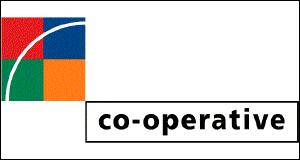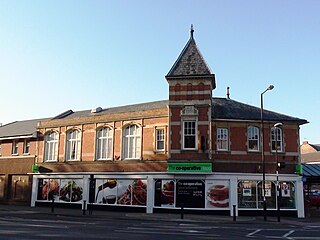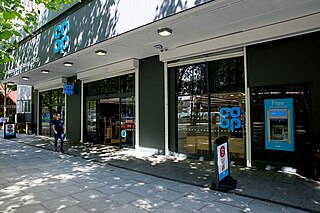
The Co-operative Group Limited, trading as Co-op, is a British consumer co-operative with a group of retail businesses including grocery retail and wholesale, legal services, funerals and insurance retailing.

Co-operative Retail Services was the second-largest consumer co-operative society in the United Kingdom. In 2000, it was dissolved by its members, merging with the larger Co-operative Wholesale Society, to form the Co-operative Group (CWS) Ltd.
The United Kingdom is home to a widespread and diverse co-operative movement, with over 7,000 registered co-operatives owned by 17 million individual members and which contribute £34bn a year to the British economy. Modern co-operation started with the Rochdale Pioneers' shop in the northern English town of Rochdale in 1844, though the history of co-operation in Britain can be traced back to before 1800. The British co-operative movement is most commonly associated with The Co-operative brand which has been adopted by several large consumers' co-operative societies; however, there are many thousands of registered co-operative businesses operating in the UK. Alongside these consumers' co-operatives, there exist many prominent agricultural co-operatives (621), co-operative housing providers (619), health and social care cooperatives (111), cooperative schools (834), retail co-operatives, co-operatively run community energy projects, football supporters' trusts, credit unions, and worker-owned businesses.

A consumers' co-operative is an enterprise owned by consumers and managed democratically and that aims at fulfilling the needs and aspirations of its members. Such co-operatives operate within the market system, independently of the state, as a form of mutual aid, oriented toward service rather than pecuniary profit. Many cooperatives, however, do have a degree of profit orientation. Just like other corporations, some cooperatives issue dividends to owners based off a share of total net profit or earnings ; or based off a percentage of the total amount of purchases made by the owner. Regardless of whether they issue a dividend or not, most consumers’ cooperatives will offer owners discounts and preferential access to good and services.

The East of England Co-operative Society is the fourth largest consumer co-operative in the United Kingdom after The Co-operative Group, The Midcounties Co-operative and Central England Co-operative. It is a registered society with its headquarters in Wherstead, near Ipswich and trading in the eastern counties of Essex, Suffolk and Norfolk. The Society is the area's largest independent retailer.

The Penrith Co-operative Society Limited, known locally as Penrith Co-op, was a small regional consumer co-operative in the United Kingdom. The society was formed in 1890 and at the time of its merger with Scotmid it operated one department store with supermarket attached and eight small supermarkets or convenience stores in Cumbria and County Durham.

Nisa Retail Limited is a brand and groceries wholesaler operating in the United Kingdom. It is a wholly owned subsidiary of the Co-operative Group Limited. It was formerly a mutual organisation owned by its members and operating "...like a co-operative, using the collective buying power of the large group of members to negotiate deals with suppliers".
The history of the cooperative movement concerns the origins and history of cooperatives across the world. Although cooperative arrangements, such as mutual insurance, and principles of cooperation existed long before, the cooperative movement began with the application of cooperative principles to business organization.

The Clydebank Co-operative Society Limited is the smallest consumers' co-operative in Scotland, based in the town of Clydebank near Glasgow. Along with Scotmid and The Co-operative Group, it is one of three consumer co-operative retail societies in Scotland, and the only one not merged into a regional or national society.
Radstock Co-operative Society is a small regional consumer co-operative, which was established in Radstock, Somerset, England in 1868 and today operates twenty food stores and across Somerset alongside a 1000 acre farm. It is owned and democratically controlled by its customer members, who numbered approximately 7000 in 2014. The society grew from a turnover of £15 million in 2006 to over £35m by 2016, doubling the number of stores over the period. The business has held the Fair Tax Mark since 2016.

Musselburgh and Fisherrow Co-operative Society Limited was a retail consumer co-operative trading in the Scottish towns of Musselburgh and Dalkeith. It was founded as a co-operative in 1862, and, in 2007, joined the small number of UK co-operative retailers to demutualise.

Lothian, Borders & Angus Co-operative Society Limited , founded in 1839 in the Scottish Borders, was the oldest independent consumer co-operative in Scotland until it merged with The Co-operative Group in December 2008. It operated over 50 food stores in the south and east, as well as some other retail businesses, and funeral services. At the time of the merger, Lothian Co-op was owned by 65,000 consumer members on a one member one vote basis.

Co-op Food is a brand used for the food retail business of The Co-operative Group in the United Kingdom.
Anglia Regional Co-operative Society Limited was the fifth largest consumer co-operative in the United Kingdom. It was formed by the merger of the Greater Peterborough Regional and Anglia co-operative societies in 1987. The Society had over 80 stores, principally trading in East Anglia. Head office was located at Westgate House, Peterborough until 2011.
The Moulton Co-operative Society Limited, or simply Moulton Co-op, was a small regional consumer co-operative in the United Kingdom. The society was formed in 1861 and operated a single supermarket in Moulton, Northamptonshire. In January 2009, members voted overwhelmingly to transfer arrangements to Midlands Co-operative Society, which took effect on 8 February 2009.

The Co-operative, also known as Co-op, is a brand used by a variety of co-operatives based in the United Kingdom. It is not a single business, but a number of different consumers' co-operatives spanning various sectors.

The Co-operative Travel is a travel agency brand used by some independent retail co-operatives in the United Kingdom, such as Midcounties Co-operative, through their access to The Co-operative brand. Between 2011 and 2016 the brand was also used by TCCT Retail Limited, a travel agency run as a joint venture between the Thomas Cook Group, The Co-operative Group and Central England Co-operative.

The Heart of England Co-operative Society is an independent consumer co-operative in the United Kingdom. Based in Coventry, the Society trades in the English counties of West Midlands, Warwickshire, Leicestershire and Northamptonshire.
Central England Co-operative, trading as Central Co-op, is a regional consumer co-operative in the United Kingdom, based in Lichfield and which trades from over 400 sites across the English Midlands and East Anglia. The business is owned and democratically controlled by its members who can stand for election to the board and who also share in the society's profits. A proportion of the profits of the business are also invested in local community groups through its community dividend grants programme and its more than 60 member classes.

Coniston Co-operative Society is a small consumer co-operative in Furness, Cumbria, England. It is one of the few retail societies operating a single village store to remain independent.












